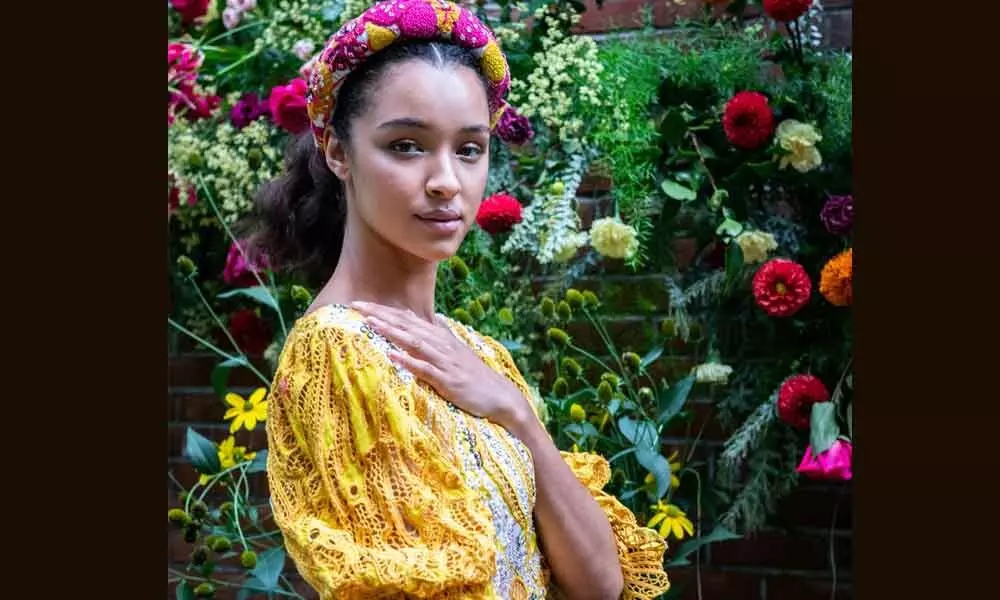Live
- South Korea: Yoon believes impeachment trial takes priority over martial law probe
- Strict Action for Non-Adherence to Time Management - DMHO Dr. Swarajya Lakshmi
- Over 13.29 lakh houses approved for rural poor in Maharashtra: Shivraj Chouhan
- District Collector Urges Timely Completion of Indiramma Housing Scheme Survey
- Digital Arrest Scam: Hyderabad Man Duped of ₹7 Lakhs by Fake Crime Branch Police Callers
- Sukhbir Badal seeks President's Police medal for officer who saved his life
- US Firm Accordion Acquires Merilytics, Launches 1,500-Seater Office in Hyderabad
- Free Medical Camp Organized by Alampur Advocate Bar Association
- Allu Arjun Receives Notices from Police for Further Inquiry
- Key aide of terrorist Landa arrested by NIA from Mumbai in Punjab terror conspiracy case
Just In
Roopa Pemmaraju brings Indian summer to New York Fashion Week


Dopamine dressing with a serving of desi brilliance
Dopamine dressing with a serving of desi brilliance
Brooklyn-living Indian designer Roopa Pemmaraju made her New York Fashion Week debut this Wednesday. The collection was a riot of colour with an ode to Indian artistry, yet there was an overall easiness to everything. Held at The Merchants House in the heart of New York City, the collection named the "Suncatcher", is designed for global audience, while being a celebration of her Indian roots.
This was dopamine dressing with a serving of desi brilliance, as Swarovski crystals highlighted the hand embroidered details. This slow fashion designer mixes block printing with digital printing, and opts for sustainable techniques that do not over consume water and other resources. From fun crop tops with midi skirts to joyous sundresses, shapes were kept uncomplicated, so that craftsmanship and colour (Gulabi pink is her go to colour for Summer 2022) remains the focus of her designs. With graphic floral patterns inspired by the gardens of her home country being de rigueur, Roopa brought an Indian Summer to New York. Retailing out of stores like Anthropolgie, the under the radar designer tells us about her fashion journey.
Tell us about the roots of the brand, with its start in Australia, but now an American based label?
The brand was founded when I was in Australia. I was feeling very homesick, for home, my family, and for the rich colours and art of India. But I soon started finding such inspiration from the indigenous art of Australia and wanted to find a way to collaborate with these artists while still connecting to my homeland. Now that we are based in New York, we are better positioned to reach an even larger audience. We will always stay true to our Indian roots, and to our mission of human sustainability.
Tell us about your approach to artisanship?
By employing skilled artisans and paying them fairly for their craft, we create vibrant, one-of-a-kind clothing in a way that respects our planet and its people. We make conscious choices that celebrate the beauty of the natural world, and that creates jobs for artisans.
Which crafts are recurring in your collections?
Beautiful hand embroidery and beading embellish our collections, although this collection is a little different because we are using Swarovski crystals to adorn our ensembles. Block printing is one of the traditional practices we use, where our artisan's hand-carve wooden blocks with elaborate patterns and stamp the painted blocks onto fabric for one-of-a-kind prints. We also use digital printing as a sustainable way to dye fabrics, as this technique uses less water and ink compared to other methods.
You were very vocal about the role of face masks in helping the Indian craft worker during the time of lockdown, explain how masks helped the artisan?
Though the whole world was impacted greatly during the pandemic lockdown, we saw such a need for support in our artisan community. Loss of jobs led to starvation, due to the decline of large retail manufacturing during the lockdown. We wanted to do as much as we could to support our artisan community. We were so encouraged by the great response we had to our masks and are still having. The sale of just one mask can supply one artisan family with many days' worth of food. When Anthropologie ordered over 20,000 of our sustainable masks, it was a tremendous help, getting our artisans back to work, supporting themselves and their families again, during such difficult times.
You have such a joyous sense of colour?
I have always been inspired by my memories of my grandmother's sarees. She would pick a flower from her garden and take it to the artisans to match the colour. There was such vibrance and uniqueness to this process that I have carried it with me to this day. We choose flowers that are indigenous to our Bangalore artisans, so they can understand the colours we want to capture.

© 2024 Hyderabad Media House Limited/The Hans India. All rights reserved. Powered by hocalwire.com






